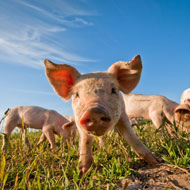ASF risk level raised to medium in the UK

The risk of exposure to the UK’s pig population is still considered to be ‘low’.
The risk of African swine fever (ASF) entering the UK via contaminated pig products has been raised to ‘medium’, following a recent upswing in outbreaks on commercial pig farms in Romania and Poland.
Bulgaria also reported its first outbreak in backyard pigs on 31 August. Four out of seven pigs died and the remainder were culled.
Several thousand tonnes of Romanian-origin meat per annum are consigned to the UK from EU member states.
According to the APHA’s latest risk assessment, the risk of exposure to the UK’s pig population is still considered to be ‘low’.
Since 22 August, Romania has seen 42 new outbreaks in several regions - four of which occurred on commercial pig farms with more than 140,000 pigs on affected premises.
Meanwhile, the disease was detected for the first time in China in early August. The country’s sixth outbreak, on a farm with 459 susceptible pigs, was reported on 31 August in Yanhe Village, Anhui. China’s agriculture ministry has introduced a ban on transporting pigs or pig products from provinces where ASF has been confirmed, and is set to shut down live pig markets in the region.
APHA will reassess the risk to the UK every two weeks. Pig keepers are reminded not to feed swill to their animals and to be aware that visitors to their premises should not have had any recent contact with affected regions.
ASF should be considered as a possible diagnosis, even in single pigs with haemorrhagic lesions, lethargy, skin discolouration or petechiation and high fever. Any suspected cases must be reported to APHA immediately.



 RCVS Knowledge has welcomed Professor Peter Cockcroft as editor-in-chief for Veterinary Evidence.
RCVS Knowledge has welcomed Professor Peter Cockcroft as editor-in-chief for Veterinary Evidence.